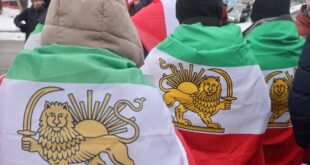TEHRAN (AP) — Iran and Syria on Thursday denounced a new Iraq strategy announced by US President George W. Bush that blames them for fuelling violence in the war-torn country. Tehran and Damascus said the plan to send more US troops would only increase bloodshed in Iraq.
Bush’s speech Wednesday evening underlined the president’s staunch rejection of recommendations that Washington reach out to its rivals Syria and Iran in an attempt to calm Iraq.
Instead, Bush set out plans to isolate the two countries, calling on help from Arab allies and vowing to cut off Syrian and Iranian aid to armed groups in Iraq. He announced the deployment of an additional aircraft carrier battle group and of Patriot air defence missiles to the region — seen as muscle-flexing towards Iran.
In Tehran, foreign ministry spokesman Mohammad Ali Hosseini said Bush’s plan to send 21,000 more troops to Iraq was a “continuation of occupation” that will only “extend insecurity, danger and tension in the country.
This will not help to solve Iraq’s problems.” A few hours before Bush’s speech, Syrian Vice President Farouk Sharaa said Wednesday that the American troop surge was “not a positive step” and would only “pour oil on the fire.” Iran has close ties to Shiite factions blamed in Iraq’s wave of sectarian killings, and Washington accuses it of providing the fighters with weapons and money. The United States also accuses Syria — Iran’s ally — of providing refuge for some leaders of the Sunni-led insurgency and allowing gunmen to cross its border into Iraq.
Bush vowed that US troops “will interrupt the flow of support from Iran and Syria.” Iran and Syria both denied supporting fighters in Iraq.
Iran’s Hosseini said the US, “by accusing other countries of meddling in Iraq, tried to cover up its wrong policies in the country.” The new offensive by US forces, along with Iraqi troops, aims to put down both Sunni insurgents and Shiite gunmen in Baghdad. But there was widespread scepticism in the Arab world that the Shiite-led Iraqi government of Prime Minister Nouri Maliki will really act against the factions, even though it has said it will.
Many observers believe Iran could try to use its influence with Maliki and Shiite parties in the government to avert any crackdown on the armed groups. “It is very difficult, with the heavy Iranian involvement in Iraq, which aims at foiling Bush strategy and forcing him to withdraw,” said an Egyptian military expert, Brig. Hossam Sweilem.
Iran on Thursday quickly began to depict the US plan as an attempt to control Iraq for the benefit of Israel.
Hosseini said the deployment of Patriot missiles in the region “is part of the US policy direction to create a support umbrella for the Zionist regime through an Islamic country.” Commentators in Iran and Syria predicted the new Bush strategy would fail — and in Damascus, there were signs of disappointment that Washington had rejected the idea of opening a dialogue with the country.
The plan’s “failure will register the name of Bush as a vanquished president in the political history of the US,” Iranian state television said in a commentary.
Syrian analyst Imad Shueibi, who often reflects the government’s view, called Bush’s accusations of Syrian and Iranian support for armed groups “a worthless broken record.” “If Bush wants to ignore Syria, he would thereby ignore the possibility of finding a solution to the situation in Iraq and to stability in the region,” he said.
The state-run Syrian newspaper Tishrin predicted “Bush’s strategy will be another catastrophe and the Iraqi people will be the only loser.” In the streets of Tehran, there was dismay at the prospect of the United States increasing its military presence in neighbouring Iraq.
Hossein Rahimi, a 49-year-old veteran of Iran’s 10-year war with Iraq, said: “Sending more troops means more casualties. Any simple military personnel know it.” “The US has already spent a lot for military purposes in Iraq. If it had spend it for reconstruction and development, then Iraq could have been a role model for the whole region,” said Reza Mahmoudi, a 50-year-old engineer.
 Eurasia Press & News
Eurasia Press & News



